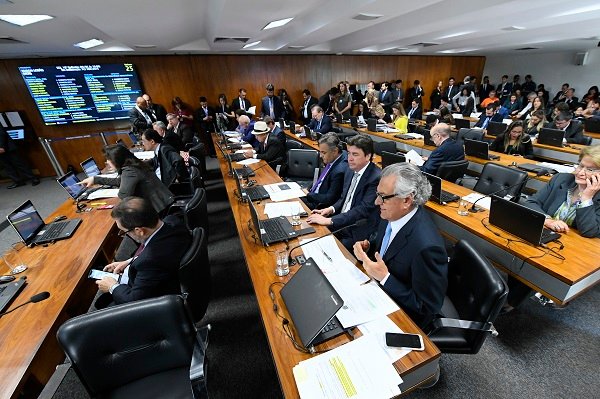The Constitution and Justice Commission (CCJ) approved on Wednesday (10/05) Bill 3,283/2021, which typifies as terrorist acts the conduct practiced on behalf or in favor of organized criminal groups. The proposal goes to the Federal Chamber.
This Content Is Only For Subscribers
To unlock this content, subscribe to INTERLIRA Reports.
The project equates the actions of criminal organized groups to terrorist activity. A mechanism was included in the project to consider political motivation in typification of the crime of terrorism. The motivations already foreseen are xenophobia, discrimination or prejudice of race, color, ethnicity, and religion. The justification was that the amendment seeks to include conduct such as those made against the Three Powers Palaza, on 8 January, 2023. The attacks and threats to the lives of public servants were also included in the actions typified as a crime. The change was made after, on 22 March, a Federal Police (PF) operation arrested nine members of the First Capital Command (CCP), who planned to attack servants and public authorities.
Threat to institutions
Senators criticized the fact that criminal organizations threaten the state and its institutions and yet are charged according to a legislation that provides for a penalty of one to eight years. For the rapporteur, this would be one of the reasons for the population to feel wronged and little represented by the authorities. According to the project, they will be punished with a penalty of 12 to 30 years in prison conduct practiced on behalf or in favor of these organizations. Between them: Create obstacles or limits to the free movement of persons, goods, and services to exercise parallel power in a given region or urban or rural territorial zone; and maintain territorial monopoly, any other type of social control or parallel power, either in urban or rural zone, using violence or threat. Criminalization does not apply to the individual or collective conduct of people in political manifestations, social movements, union, religious, class or professional category, directed by social purposes. It also does not apply to acts in order to contest, criticize, protest or support, with the purpose of defending constitutional rights, guarantees and freedoms, without prejudice to the criminal typification contained by law.
Sentence
The project provides for a five to 10-year arrest for those who constitute, organize, integrate, maintain or fund a paramilitary organization, private militia, group or squad, for the purpose of committing a crime. The penalty also provides for payment of R$ 2,000 to R$ 3,000 fine per day. The text also expands the definition of militias. Instead of a group that is organized to commit crimes provided for in the Penal Code, the classification applies to any organized group for committing crimes. Regarding the Anti -Drug Law, the proposal frames the crime of terrorism the association of two or more people in order to practice, repeatedly or not, drug trafficking. In this case, the proposal determines imprisonment of five to ten years and payment of R$ 1,200 to R$ 2,000 fine per day.
Our Analysis:
The text gained strength in the Senate after a series of attacks in the Rio Grande do Norte state in March this year. Delegates, congressmen linked to social movements and the movement of landless rural workers (MST), however, says that the proposal, if approved in the House, can reach social movements and frame common crimes as terrorism. The National Association of Federal Police Delegates stated that the approval of the project entails the framing of numerous common crimes such as terrorist acts. The project distorts international concepts normally adopted when it comes to terrorism. In addition, the proposal brings very comprehensive criminal types, which lead to legal insecurity in the interpretation of the norm and attract to the federal level an uncountable number of investigations, which will certainly cause an overload of the Federal Police and the Federal Justice. Also, experts understand that even with safeguards in the text, social movements can still be criminalized.
Source: Senado




